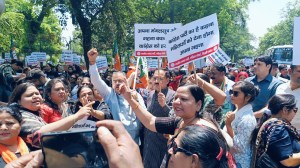- India
- International
For us, without us
In the hurry to pass the disabilities bill, its flaws have been buried.
 A clean and accountable government is not and cannot be an end in itself.
A clean and accountable government is not and cannot be an end in itself.
One of the most inexplicable things about the Rights of Persons with Disabilities Bill is the incredible perceived public pressure to introduce the bill in the next, and for this Lok Sabha, last, session of Parliament. Many of us who refused to join the clamour did so on the grounds that we did not know what changes had been made to the bill since its 2012 avatar (not to say that the 2012 draft was perfect) and that we feared for the worst. Judging by the copy of the bill that has been released, our fears were not unfounded.
The bill, which sets out to implement the United Nations Convention on the Rights of Persons with Disabilities (UNCRPD), gets most things wrong — including the definition of persons with disabilities — and is sloppily drafted. Almost every principle of the UNCRPD, which India ratified without reservations, has either been diluted or violated outright by this bill — be it the right to equality and non-discrimination, the right to independent living, the right to inclusive education or the right to political participation.
One of the most important rights the UNCRPD guarantees is that of full legal capacity to all persons with disabilities. At present in India, the National Trust for the Welfare of Persons with Autism, Cerebral Palsy, Mental Retardation and Multiple Disabilities Act (NTA), 2009, creates a presumption that persons with cerebral palsy, autism, mental retardation or multiple disabilities require a guardian to function. The Mental Health Act, 1987, also provides for the appointment of a guardian for a person found to be “mentally ill” and incapable of handling their own assets.
The UNCRPD mandates that persons with disabilities have the right to be recognised as persons before the law, and enjoy the same legal capacity as others in all aspects of life. Neither of these mandates is reflected in the bill. Though persons with disabilities are granted the right to own or inherit property, control their financial affairs and obtain access to bank loans, mortgages and other forms of financial credit, there is no effective manner of realising these rights and no provision for safeguards whatsoever.
In any case, these provisions only apply to persons who have legal capacity, and there are exclusions to this, perhaps unprecedented in Indian law. There is no shift from substituted decision-making to supported decision-making. The “mentally ill” who are unable to take care of themselves or make legally binding decisions will have all decisions taken on their behalf by guardians. The position of persons governed under the NTA does not change at all. And then, more categories of persons with disabilities may have their legal capacity threatened. The bill creates the category of persons with “high support needs”. Any person with more than 40 per cent of a disability and who needs “intensive support, physical, psychological and otherwise,… for activities of daily living; independent and informed decision-making; accessing facilities and participating in all areas of life including education; employment; family and community life; and treatment and therapy” is included in this category — effectively all persons with over 40 per cent disabilities. An assessment board gets to take decisions on the nature of “support” to be given to these persons, with no obligation to consult the person concerned. The scope of “support” is not defined under the bill, which means it could include guardianship or even institutionalisation, neither of which are barred.
Undoubtedly, the bill opens up various opportunities — there are incentives for the private sector to accommodate persons with disabilities, and with that will come requirements for training the persons who are employed, sensitising other staff members and making workplaces accessible. These measures are beneficial to many. However, is it worth shutting the door on discussions in order to — quoting the Centre for Advocacy in Mental Health — “secure maximum rights for maximum people with disabilities; and lay to rest the original inclusive concern about all rights for all persons with disabilities”? One could possibly argue that other concerns could be addressed in the form of amendments at a later stage — but these amendments would be fragmented discussions, running contrary to the cross-disability movement that the drafting of the bill and the UNCRPD have come to symbolise. Like charity, inclusion starts from home.

For a flailing government trying its best to play to the gallery, enacting a “social welfare” legislation like the Rights of Persons with Disabilities Bill is a marvellous opportunity. Something as serious as an all-encompassing legislation for all persons with all disabilities deserves more than to be reduced to a bullet point on an election poster.
The writer is an advocate, and fellow, Inclusive Planet Centre for Disability Law and Policy, Chennai
express@expressindia.com
EXPRESS OPINION
More Explained
Apr 24: Latest News
- 01
- 02
- 03
- 04
- 05










































